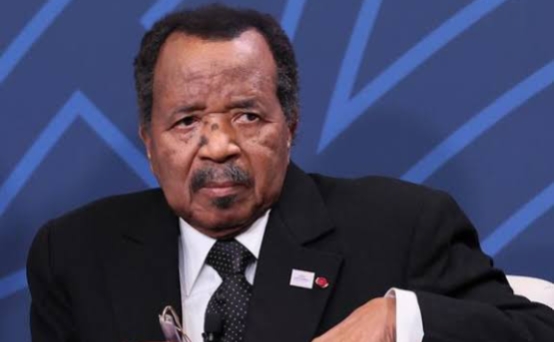By Sekaggya Seka Moses
The world’s oldest head of state, Cameroon’s President Paul Biya, 92, has said he will run once more for re-election in October aiming to extend his 43 years in power.
“Rest assured that my determination to serve you matches the urgency of the challenges we face,” he said in a post on X.
He added that his decision to go for an eighth term came after “numerous and insistent” calls by people from all regions in Cameroon and the diaspora.
Biya’s administration has faced criticism over corruption, embezzlement, bad governance and failure to tackle security challenges. There have also been concerns about his health and ability to govern.
His absence from the public for more than six weeks last year led to speculation about his well-being and unfounded rumours that he had died.
His candidacy was expected but not formally confirmed until Sunday’s social media post.
Biya has never lost an election since taking power in 1982 and if he wins another seven-year term he could be president until he is nearly 100.
There have been growing calls from inside and outside Cameroon for him to step aside and give way for fresh leadership in the central African nation.
His candidacy follows a recent political divorce from key allies from the northern regions, who had been crucial in helping secure votes in previous elections from that part of the country.
Two of these men – prominent minister Issa Tchiroma Bakary and former Prime Minister Bello Bouba Maigari – recently quit the ruling coalition and separately announced plans to run in the election.
Last month, Tchiroma said the Biya administration he belonged to had “broken” public trust and he was switching to a rival party.
Multiple opposition figures, including 2018 runner-up Maurice Kamto, as well as Joshua Osih, Akere Muna, and Cabral Libii, have also announced their candidacies.
However, members of the governing Cameroon People’s Democratic Movement and other supporters have since last year publicly called for Biya to seek another term. He was already the de-facto candidate as the party leader.
Biya abolished term limits in 2008, enabling him to seek the presidency indefinitely.
He won the 2018 elections with more than 71% of the vote although opposition groups accused the process of widespread irregularities.
Biya, who is seeking a new term that could keep him in office until he is nearly 100, came to power more than four decades ago in 1982, when his predecessor, Ahmadou Ahidjo, resigned.
In 2018, in a first, he also used social media to announce his candidacy for that year’s presidential contest, marking a rare direct engagement with the public on digital platforms.
Members of the governing Cameroon People’s Democratic Movement (CPDM) and other supporters have since last year publicly called for Biya to seek another term.
But opposition parties and some civil society groups argue his long rule has stifled economic and democratic development. Two former allies have quit the governing coalition and announced plans to separately run in the election.
“President Biya’s announcement to run again is a clear sign of Cameroon’s stalled political transition. After over 40 years in power, what the country needs is renewal – not repetition. Cameroonians deserve democratic change and accountable leadership,” Nkongho Felix Agbor, a human rights advocate and lawyer, told The Associated Press news agency.
Sunday’s announcement is sure to revive debate over Biya’s fitness for office. He seldom makes public appearances, often delegating responsibilities to the powerful chief of staff of the president’s office.
He won the 2018 election with 71.28 percent of the vote, though opposition parties alleged widespread irregularities.
The cocoa- and oil-producing Central African nation, which has had just two presidents since independence from France and the United Kingdom in the early 1960s, is likely to face a messy succession crisis if Biya were to become too ill to remain in office or die.
All have criticised Biya’s long period as head of state and called for reforms to ensure a fair vote in 2025.
Under Biya, Cameroon has faced economic challenges and insecurity on several fronts, including a drawn-out separatist conflict in its English-speaking regions and ongoing incursions from the Boko Haram armed group in the north.
Have An Advert Or Article You Want Us To Publish? Whatsapp: +256786288379 or email binocularugnews@gmail.com
